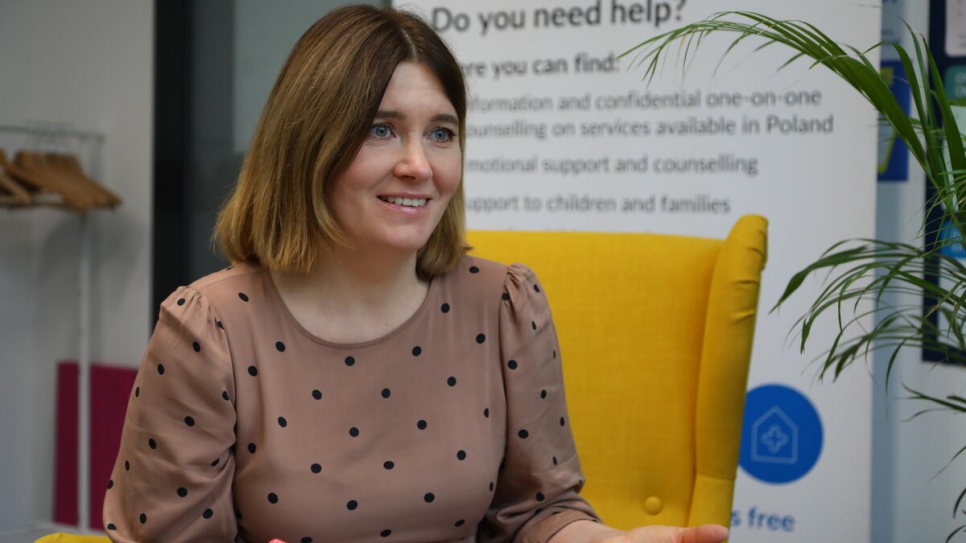In Poland, a Ukrainian psychologist helps her fellow refugees
The devastating effects of the international armed conflict in Ukraine are still being felt by those fleeing inside the country and across borders, but not all wounds are visible.

Ukrainian psychologist Inna Chapko (left) providing information about psychosocial services at a Blue Dot Hub in Warsaw. © UNHCR/Tarik Argaz
When Ukrainians were forced to flee in the days and weeks after the war began, every train heading west was filled to bursting with anxious, exhausted, and terrified civilians. Inna Chapko, a Ukrainian psychologist, was among them, leaving her home in the capital, Kyiv, a few weeks after the start of the war in February. “Leaving was one of the most difficult decisions I‘ve ever taken,” she said.
During the long hours of travel in crammed train carriages, Inna put her professional skills to use. She improvised a game based on stress relief techniques that helped calm the minds of the tired, hungry, and scared children. She gathered them together and showed them how to cross their arms and clasp their shoulders, then breathe deeply through their noses while tapping rhythmically with their hands. As the children calmed down, parents joined in too, and soon the cries subsided and the rumbling of the train on the tracks was all that could be heard.
Once safe in Warsaw, Inna decided to use her expertise to help fellow Ukrainians who, like herself, have suffered the trauma and hardship of displacement. Today, she works at one of Poland’s six Blue Dot hubs – support centres for refugees, established by UNHCR, the UN Refugee Agency, and UNICEF, the UN Children’s Fund. The hubs offer mental health services in addition to social support, legal aid, administrative support, referrals to specialized services, and areas designed for children to play and relax.
“Nearly one in 10 of the refugees approaching the Blue Dots have questions on mental health and psychosocial services,” said Inna, who runs weekly stress relief sessions and grounding exercises for women, as well as individual counselling sessions, and art therapy groups.
At the Blue Dot hub, she met Natasha* who had fled the town of Irpin, outside Kyiv, in March, telling her children, “Two weeks and we will be back!” as she hastily locked their apartment door before running for safety between waves of artillery shelling.
The 34-year-old has been living in Poland ever since, waiting until it is safe enough to return home. Natasha had never left Ukraine before, nor travelled without her husband, and as the months went by, the costs, challenges, and responsibilities of bringing up two young sons alone in a foreign country have weighed heavier by the day.
Shortly after settling in Poland, Natasha heard about the death of her aunt in Ukraine, and the news pushed her to the brink, triggering overwhelming feelings of grief and anxiety – “She was like a second mother to me,” Natasha said – so she sought help at a Blue Dot.
There, Inna listened to Natasha’s story and helped her manage her stress and emotions before guiding her through the different services available, as well as how to access those provided by the Polish healthcare system.
“No one is prepared for such experiences,” Inna said of the trauma Ukrainians have suffered over the last eight months, “but most refugees who go through stressful events don’t think to ask for help. They continue living with the ‘survival mindset’ that they developed during times of crisis, and their wounds only deepen.”
She continued, “There is a time to be strong and brave, and a time to settle, relax, and accept the need to process the negative thinking, emotions, and memories into something neutral, or even positive.” Talking – and being heard – is a crucial first step.
Poland, unlike many other refugee-hosting countries worldwide, has a well-established healthcare system even though people with mental health issues sometimes face difficulties with their referral to specialists. The role of Blue Dots is key, but primarily as a first port of call for struggling refugees, helping them to access public services.
UNHCR is also working with other organizations and national mental health professionals to provide training and guidance on specific groups of refugees, including survivors of violence, women and girls at risk, and unaccompanied or separated children.
Natasha said that talking with Inna was her first time meeting a mental health expert, and that it had provided a vital lifeline as she tries to find her feet in a new country. “Our thoughts are in Ukraine,” she said, “but we need to make the most of our stay here in Poland, to sustain ourselves.”
Since March, over 36,400 refugees from Ukraine have received support at Poland’s six Blue Dot hubs, but Inna said there is still more that mental health professionals such as herself can do, including by striving to be more proactive in order to reach more people in need.
“At the Blue Dot, we often need to take the first step,” she said, “and go towards refugees who may need support, as opposed to waiting for them to approach us first.”
*Name changed for protection purposes
About Blue Dots
Blue Dots are support hubs that bring together critical protection services and information for refugees fleeing the war in Ukraine, with a particular focus on children and those at greatest risk. These include unaccompanied and separated children, persons with disabilities, cases of suspected trafficking, survivors of sexual or gender-based violence and refugees from the LGBTIQ+ community. Established by UNHCR, the UN Refugee Agency and UNICEF, the UN Children’s Fund, together with local authorities and partners along the major crossing points and transit routes, Blue Dots provide a safe space, support and referrals for health
care, education, psychosocial support and more. Read more




